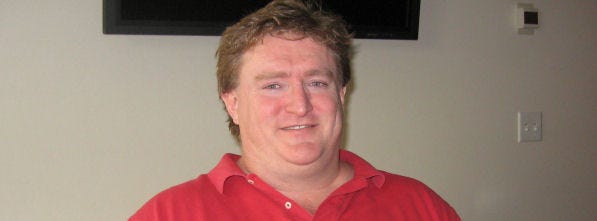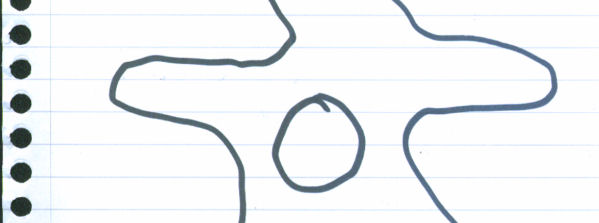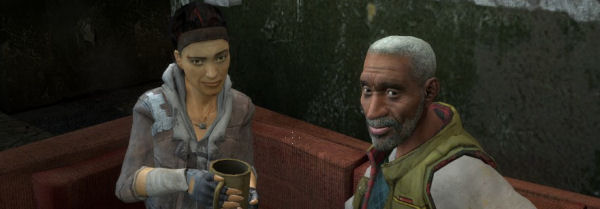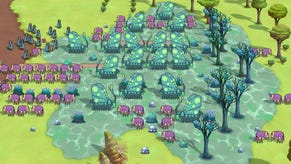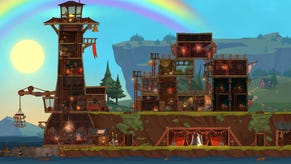RPS Exclusive: Gabe Newell Interview
In our exclusive conversation with Gabe Newell, we discuss the nature of Valve as a company - its ethos and potential, the real reason Gabe hired the Portal team, the vision for Steam, and indeed all online distribution, have every game ever available to download, Gabe's beginnings with id, and how Valve was very nearly called Rhino Scar.
At any other games developer, Gabe Newell would be the big boss man. Technically, he is at Valve too, but due to the unique structure of their business, Gabe appears as just another name in the alphabetical list at the end of their games. Having graduated Microsoft with financial security for life, he could have gone on to do anything. What he chose to do was make Half-Life - one of the most signficant PC games of all time. The business Valve has grown into is a remarkable one. Developers are not at the behest of evil money men, driving them to rush releases through to meet financial targets. Teams work in relaxed, open environments, interchanging who works where, who is responsible for what. Anyone is able to bring ideas to the table, and the company is constantly looking out for potential amongst modding communities and indie developers. The man who lets all this happen is Gabe Newell.
RPS: Do you think of Valve as a philanthropic company?
Gabe: I don't usually think of it that way. We think of ourselves as very much grounded in the community, and as part of the community. We've got our role; everyone has their role, whether it be the press or people who build levels, and so forth. We feel like we're in there as part of the community, rather than benevolently standing above it.
RPS: That must be deliberate though, because you could so easily position yourself in a benevolent role, over and above the community?
Gabe: Yes, but I think that's dangerous. We all got our start as fans. There's a tremendous power in bringing that perspective into game design: wanting to make something that really is worth people's time and money. It also gives you a sense of how few opportunities you have – we all know people in the industry where you can look at them and say “well you did this great thing here and then wasted the opportunity in subsequent years.” They just threw something together and that's two or three years out of their career that they're not going to get back.
We're also trying to make sure that we make the most of the incredible good fortune that we've had, and that it benefits everyone who has supported us.
RPS: So back to that philanthropic position...
Gabe: I think it's more egalitarian, we view ourselves as being in the mix with everyone else. We have this kind of shared desire to build these types of entertainment experience, and everyone contributes in some way. Someone running a server out of their home using a DSL line on their PC is being philanthropic, but we're colleagues of all of these people and that's what game design needs to be.
There's not an auteur, not the fiction that movie people tell themselves about the movie occurring in the director's head, and it being your job as someone who's witnessing that on the screen to connect with that vision. That's a terrible way to think about videogames, because they're a collaboration. You've got this lead actor and they don't have a copy of the script, but if they're not having a great time then it doesn't matter what you thought you were doing. All that matters is your ability to engage with him. You have to focus on collaboration, you have to focus on this sharing of authoring the performance with gamers. That design approach is consistent with our feeling of being part of the community as well, I think.
RPS: This has come up repeatedly as I've been talking to designers at Valve, this idea of involving people in the design process. Is that part of staying grounded in the community?
Gabe: Yes. Everybody here has the story about the first time they built something at Valve and then had to watch when someone from the real world came in to try and play it. There's the initial denial, “Oh they did it wrong,” and then a sort of horror at how poorly their concepts held up in the face of real players. And then there's this Elisabeth Kübler-Ross “five stages of dying”, you know: bargaining, anger, depression and then acceptance. You finally realise how important it is to internalise what it is that people go through when they play this stuff.
RPS: Why is it that Valve seem to be able to do that so successfully? What gives you the freedom to do it?
Gabe: Well we do have freedom. I think lots of games reach a stage where people say, “Okay, let's ship it,” when there's really twenty or thirty percent of the work left to be done on a project. There's enormous pressure on publicly owned companies to meet quarterly objectives, and people who are not gamers just don't understand: they can't see the difference between a done game and “almost-done” game. They don't understand why the people building it keep pushing them back. They say, “Are there show-stopper bugs?” and if they answer is no then they ship it. Their bonus will be based on the targets for that quarter, and they'll be off working somewhere else the next year anyway.
Here the company is not owned externally, we do not receive our funding externally, everybody who works here owns a part of the company and they have a long-term interest in the company. They are all concerned with the long-term success of how we do. That freedom to get it right allows us to recognise that just because you can run through the game and it won't end up crashing, well, that doesn't mean anything. It's just a stable platform to go and fix the things you got wrong, it's not something that's ready to ship. It just means that now you've got to the serious work of getting it right.
RPS: Do you do everything in-house? Is anything done externally for the games?
Gabe: Hmm, well the music's in-house, the art is in-house... We use external voice actors. And we direct that internally.
RPS: We're really interested in your view on the independent games scene. I've just spoken to the Portal team and discussed Narbacular Drop and the job offer, and their shock and delight at finding themselves in that position...
Gabe: Something that gamers should probably understand is how important it is that game teams stick together. No matter how good a job a team does the first time they make a game they're going to do a much better job the second or third time. There's just so much value in a team having shared experiences to draw on, and my reaction looking at these kids was that they had done this fabulous thing. I go to all these trade shows and see all these tedious, derivative, lifeless games, and these kids had done something that was better than 98% of the gameplay I see. The idea that they wouldn't work together again was a tragedy. They needed an opportunity to work together and ship a full-on game. If they were able to do that exciting a game the first time, then it's nothing to what they'll be able to do in the future. It turned out to be a really good idea.
RPS: Yes, it really did. Has it ever not worked out?
Gabe: Yeah, there was a company we were working with to make a platform game on the Source engine, and we had them in-house, mentoring them and so on. And they really wanted to very independent. They went out and got expensive facilities and hired a whole load of people, and then promptly went out of business. That was very sad. We were disappointed because it seemed like they were more interested in acting like a big games company than making games. They were writing checks they weren't able to fund. So yeah, it has failed.
RPS: Was there ever a team you wish you'd been able to sign up? The team that got away?
Well, I have to be honest, it's more individuals than teams. We've been trying to hire Michael Abrash [Id Software, Dr. Dobb's Journal, RAD Game Tools] forever. I have huge respect for him, I think he's incredibly smart. About once a quarter we go for dinner and I say “are you ready to work here yet?” One day... [Laughs]
RPS: Has talent scouting been easier since Steam?
Gabe: Well we did it long before Steam. In a sense we're part of the talent scouting that (Id Software's) John Carmack did back in the mid Nineties. I was at Microsoft then, and it was down to the support of those guys [Id] that we got here. My friends and I went down to Texas and did a pitch, and John said, “Here's the Quake source code, go do something interesting.” So that long pre-dates digital distribution.
RPS: So then, after Half-Life, you went on to make Source, which is an interesting comparison with Id Software. They're often seen as making primarily engine tech, rather than a game. How do you approach engine development? Couldn't you argue that Half-Life 2 is the greatest ever demo of what an engine can do?
Gabe: It's a question of priorities; John and those guys do very cool stuff. We connect stuff to gameplay when we're thinking about why something would be useful, and you have to think about the trade-offs you'll end up making. With an infinite amount of time and money you could expand in all directions at once – do everything – but that's never the case. We have decide whether we spend time working on our shader pipeline, or do we work on artificial intelligence. So just in terms of our own process we say, “Let's start from where the customer fires up the game – what are they experiencing, how are they feeling?” What do from a technical standpoint derives from that.
[At this point the interview is interrupted and Gabe signs the Half-Life 2 book we gave away as a competition prize last month. John rambles about Rock, Paper, Shotgun and how it's early days for the site.]
Gabe: You are popular in the office. Rock, Paper, Shotgun is an awesome name, by the way.
RPS: The result of days of agonising. The four of us went through dozens of names before we got to that.
Gabe: We see a lot of bad names for companies and products, so that's a great name, as names go.
RPS: Thanks very much.
Gabe: We had other names for Valve. One was “Fruitfly Ensemble”, speaking of terrible names. Another was “Rhino Scar”, which was fun because of the visual. [Gabe draws a vague cartoon outline of a man with a circular hole through the middle of his torso - click for the full-size version] We'd have had this guy running around... But no, it was Valve.
RPS: How has Steam changed how you approach development?
Gabe: The main thing is that anything that has helped us become closer to our customers has been a benefit, whether that be on the product development side or on the support side. The early thing that was hugely beneficial was the hardware stats – we can be in meetings with Microsoft of EA and they'll say, "You guys have more information on what customers have on their PCs than we do." Intel will regularly email questions to be added to the survey.
On the gameplay side we are able to make static game design decisions, like the changes we made to Episode One. We can watch what happens in the real world – playtesting at an order of magnitude larger. We're also interested in moving things into dynamic systems, like the weapon pricing in Counter-Strike, where the community is driving the price.
Also there's the free weekends, the game passes. They're way more effective for us that buying another ad or getting coverage in magazines. We can either spend a load on bandwidth and get our games to more customers, or we can hire an ad agency, build a campaign, and get it into Wired magazine... Customers are way better. Game passes are a way better way of doing this than the indirect relationships of the past.
RPS: Given all the games that you signed up, did you expect Peggle to be such a success?
Gabe: Peggle is awesome! I don't know if you've looked at the Valve group [on Steam]? It's our number two played game at the moment. It's always fun to see what resonates with people. It's the lesson you learn: we're not smarter than our customers. It was a bit of a surprise.
RPS: Are you looking at smaller, more casual games as a direction for Valve now?
Gabe: The worst days [for game development] were the cartridge days for the NES. It was a huge risk – you had all this money tied up in silicon in a warehouse somewhere, and so you'd be conservative in the decisions you felt you could make, very conservative in the IPs you signed, your art direction would not change, and so on. Now it's the opposite extreme: we can put something up on Steam, deliver it to people all around the world, make changes. We can take more interesting risks. Retail has a kind of filter function: people hate to send boxes back, and if the boxes go back you're wasting all this money. If someone doesn't download something on Steam, we don't lose any money. If someone sends back a box, you're throwing money away. In this new world we can do things that weren't previously possible.
The print magazines are struggling because they were tied with these old methods of marketing and sales. Counter-Strike was much better understood by online than by the print magazines. Unless PR turned up on the doorstep to explain it to them, they didn't know how to deal with it. Print seemed to lag behind on that.
RPS: Yes, print has some unique problems associated with it – being a buyer's guide, being part of the publisher's preview/review cycle. But some magazines, like PC Gamer UK, have begun to dedicated lots of pages to this stuff, and older stuff, as a solution. It's great to see so many old games appearing on Steam...
Gabe: Retail doesn't know how to deal with those games. On Steam there's no shelf-space restriction. It's great because they're a bunch of old, orphaned games. They're games I want to play. The day we turned on the Team Fortress 2 beta I was sat in my office playing Quake 1, saying, “Hey, this is great!” I'd never had been able to find my original Quake discs, they are long, long gone. But it shows up on Steam and I can start playing.
RPS: And you expect more old games to show up?
Gabe: Oh yeah, I expect we'll go back in time and eventually pretty much every game that's ever been available will be on there 24/7.
RPS: Old LucasArts games?
Gabe: Sure, those are some great games. I mean there are some real problems, where the waters are muddied and companies have gone out of business. That makes things difficult.
RPS: But there's something else to all this: perhaps if LucasArts saw their 1990s games being popular again on Steam they'd lose their focus on Star Wars.
Gabe: Any chance we have go back and be reminded what was good is important to a game developer. I mean we go to E3 each year and see the flavour of the month right now, and see it repeated four hundred times, so it's refreshing to be able to look back and play the games that got us all into the games industry in the first place.
RPS: Yeah, I've been playing Hexen on Steam and remembering what it did for FPS games in terms of looking up and down and so forth.
Gabe: I wish we had Ultima Underworld on there. It's a game that I think is invisible to the current generation of game designers. Also there's a game called Shadowcaster – I seem to be the only person who has ever played it – but it was this first-person game with resources you could manage that you could transport to places, and it was really sophisticated. There's a lot of lessons to learn from that. It's a fun game to play, and there are more useful concepts than in a lot of the stuff you see coming out today.
RPS: There was talk around the release of Bioshock about you banning that game in the office?
Gabe: We had work to do! Bioshock is good enough: it would have distracted us all. When we went into cert for the 360 everyone got a copy.
RPS: And now with Steam you can see exactly who's playing...
Gabe: Through the entire company...
RPS: Very useful, I'd imagine. Did you see Bioshock as a critique of the FPS genre?
Gabe: Spiritually we're into the thinking of Ken and his team. We're interested in pushing in some similar directions, and it's interesting to see what's Ken's team have done.
RPS: Something that struck me about playing through the Orange Box is that Portal is funny, Team Fortress 2 is funny, and even Episode Two is funny – funny in a way that Half-Life never seems to have had room for before now. How important is humour for Valve?
Gabe: Personally I love for things to have dynamic range. I think realism in some parameters makes other things have more emotional impact. That's why Gordon Freeman starts off going to work. If you start things at 11 you really have no place to go. Humour is super-valuable as an emotional tool in creating narrative experiences. Whether it's horror or love stories, comedy is a really good component in the mix. The problem with humour is that if it's done badly it's amazingly destructive. My concern is that we'll over-reach ourselves, and in being comedic we'll become absurd. But we seem to be developing our voice for comedy, along with a lot of other things. Hopefully we'll continue to pull it off. Our writing team is super-valuable. Or the people who contribute to the writing, we don't have an exclusive team right now.
It's interesting to see who at Valve's brings new concepts and moves things forward. You really never know; we have a new guy doing finance and he had some interesting stuff to contribute to what we were doing with The Soldier movie. You never really know...
RPS: I have a friend (an idiot) who is determined that in six months Valve will be owned by either Microsoft or EA...
Gabe: Tell him that I'm not interested in buying either one of them.
